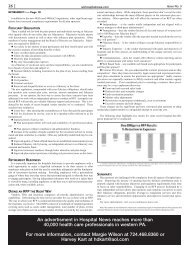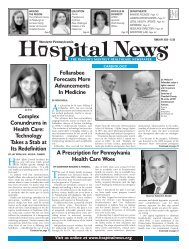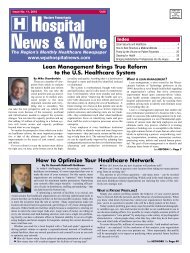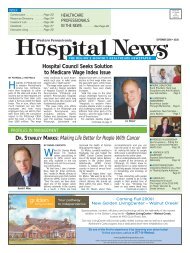McKeesport Hospital Foundation holds 33rd annual Invitational ...
McKeesport Hospital Foundation holds 33rd annual Invitational ...
McKeesport Hospital Foundation holds 33rd annual Invitational ...
Create successful ePaper yourself
Turn your PDF publications into a flip-book with our unique Google optimized e-Paper software.
36 | Issue No. 5wpahospitalnews.comDisability Income Insurance: What Every Physician Needs to KnowBy Cameron ShortDisability insurance is a crucial safeguard for anypracticing physician. Many physicians do not realize thatthe group policies purchased by many practices can oftenfall short—leaving you unpleasantly surprised after it’stoo late.Disability is surprisingly common—through accident,injury, illness. According to a recent study, most peoplebelieve they have only a 16% chance of becoming disabledduring their working years, yet: If you’re younger than 35, chances are one in threethat you will be disabled for at least six months during the course of your career. 1 Men have a 43% chance of becoming seriously disabled during their workingyears. 2 Women have a 54% chance. 2 At age 42, it is four times more likely that you will become seriously disabledthan that you will die during your working years. 2Want to be better prepared? Consider the following:LEARN THE LINGOBefore shopping for DI, know which features to look for—and the language theinsurance industry uses to describe them. The following terms are part of the languagedescribing high-quality policies, and are what you should look for to get theright coverage: Non-cancellable: To avoid the possibility of losing your coverage when youneed it most, choose a policy that’s non-cancellable and guaranteed renewable toage 65—with premiums also guaranteed until age 65. With group or associationgroup coverage, you run the risk of being dropped and left unprotected at timeswhen age or health conditions can make it difficult to qualify for other coverage. Conditionally renewable for life: Although premiums may increase after age65, your policy should be guaranteed renewable for life, as long as you are workingfull time. “Own-occupation”: Own-occupation coverage defines “totally disabled”—and therefore eligible for benefits—as being unable to perform the material andsubstantial duties of your own occupation even when working in a different occupation.As a highly skilled professional who has invested so much in education andtraining, you want to make sure you have genuine own-occupation coverage.Group coverage is rarely true own-occupation coverage. Residual Disability coverage: Through a rider, a good individual DI plan canprovide you with protection against income loss suffered as a result of partial(residual) disability—even if you have never suffered a period of total disability.This kind of residual coverage is not available with many group plans. A choice of “Riders”: Riders offer optional additional coverage such as CatastrophicDisability Benefit (CAT), <strong>annual</strong> Future Increase Options, AutomaticIncrease and Cost of Living Adjustments, or “COLA.”PROTECT YOUR PRACTICE AND YOURSELFIf you are a physician, you must also protect your income source: your practice.Special policies, available from the same DI providers who offer high-quality individualcoverage, offer your practice protection while you recover from a disability.To help meet office expenses while disabled, consider a separate type of disabilitycoverage known as Overhead Expense (OE). Benefits reimburse your practicefor expenses such as rent, electricity, heat, telephone and utilities and interest onbusiness debts and lease payments on furniture and equipment.Overhead expense insurance designed for professionals pays some additionalcosts not included in regular business overhead expense policies—including thesalaries of employees except those who are members of your profession. Forexample, salaries for the receptionist and nurse would be covered, while salariesof other physicians would not. However, high-quality professional overhead policieswill cover at least part of the salary of a professional temporary replacementfor you.IN ADDITION…Partners in group practices will want to consider a policy known as a DisabilityBuy-Out or DBO. Just as life insurance benefits can be set aside to fund a buyoutby the remaining partner(s) if one partner dies, DBO is designed to fund thehealthy partners’ purchase of the disabled partner’s share of the business. With theproper agreement in place before a disability occurs, hard feelings and the conflictscan be avoided. In combination with the disabled partner’s individual DI coverageand OE, a DBO policy can allow the business to continue to generate anincome for the healthy partner, while the disabled partner is supported by the benefitsfrom his or her individual DI policy. Any continuing share of businessexpenses is reimbursed by the disabled partner’s OE policy until the buyout iseffected.Consider upgrading your DI coverage today. Like malpractice insurance, itcould be vitally important to your future economic well-being.Cam Short is a senior vice president/Investments with the CS Group of Stifel,Nicolaus & Company, Incorporated, Member SIPC and NYSE. Cam may be reachedin the Pittsburgh office at 412-456-0208.1Gallup survey conducted for UNUM Corporation (508 respondents ages 30 to 65), reported by Best’sReview.2“Why Disability” booklet, published by National Underwriter.Erie VA Helps Veterans Recover from Traumatic Brain InjuriesJohn Parmarter was nearing the end of his yearlongtour of duty in Iraq when a bomb exploded ina marketplace, knocking the National Guard Specialistoff his feet. Immediately after the blast, Parmarterappeared unharmed, but the soldier waslater diagnosed with a mild traumatic brain injuryduring a routine, preventative TBI screening at theErie VA.“It was subtle. I didn’t wake up one day and say,‘Hey something is wrong with me.’ I started forgettingthings, messing things up—stuff I don’t normallydo,” says Parmarter. “I just assumed I was stillreadjusting from being over there. I didn’t think itwas anything serious.”Dr. Orinick, an Erie VA Polytrauma team physiatrist,says that many service members and veteranssimply brush off their TBI symptoms in the absenceof external signs of injury. This is one reason why thepreventative TBI screening—given to all returningservice members as part of their initial check-up—isso important.“Even a mild TBI can affect daily functions likememory and a change in vision, hearing, or smell,”says Orinick. “The key is to identify and treat theseproblems as early as possible. Their quality of lifeand functioning can be improved.”Last year, Erie VA treated more than 125 Veteransfor TBI’s. Patients who screen positive for a TBI arereferred to Dr. Orinick and the Polytrauma SupportClinic for an assessment and a treatment plan.Erie VA’s Polytrauma Support Clinic is a multidisciplinaryclinic comprised of staff members withareas of expertise in primary care, physical therapy,social work and occupational therapy. First, eachclinic member meets with a patient one-on-one.Then, the staff collaborates to develop a comprehensivetreatment plan for each veteran. These plans caninclude rehabilitation, medication management andbehavioral health care services.Nearly 90 percent of patients with a mild TBIrecover from their head injury within a year. MildTBI’s are often disguised behind symptoms such asheadaches, dizziness, lack of concentration, forgetfulness,irritability, balance problems, sensitivity tolight and noise, and sleep problems. Common psychologicalsymptoms include anxiety, depressionand the feeling of being overwhelmed.“I have good days and bad days. It’s like my mindgoes foggy. I lose words and I lose my train ofthought. I’m lucky though because I was really smartbefore, so now I’ll settle for just being smart,” saysParameter.Beyond providing health care services, the ErieVA also provides veterans with adaptive equipmentto help them regain some of their lost independence.Parameter received a Personal Digital Assistant(PDA) from the Erie VA. The device has beenextraordinarily in helping him remember dailyappointments and tasks, he says.Statistics suggest that some 360,000 Iraq andAfghanistan veterans may have suffered some degreeof brain injury to date. Yet, only about 9,100 servicemembers have been diagnosed with a TBI since thewar began. Eligible returning service members havefive years from their date of discharge to receive freeErie VA healthcare for any combat-related condition—includingTBI’s.“The hardest part is admitting you have braindamage and your cognitive skills are less than average,”says Parmarter. “But once you admit it, you canbegin to deal with it. The VA has helped me adapt tolife and maintain as much functionality as I can. Butit’s a process.”For questions or concerns regarding TBI injuries,please call Stacy Fritts, RN, at(814) 860-2647.
















